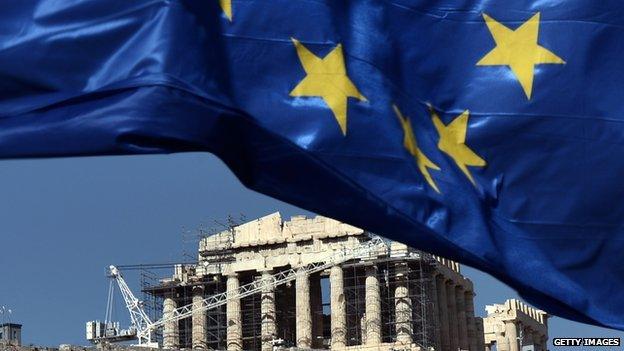Spectre of Grexit once again
- Published

After the third and final unsuccessful attempt to elect a president, the stakes are high as Greece will call early elections.
The ruling coalition led by New Democracy is lagging in the polls behind Syriza, an anti-austerity party, whose rise reflects recent polls that show Greeks are frustrated with the EU and even suggest that more Greeks want to return to the drachma than keep the euro. It raises the spectre of Greece's exit from the single currency - or "Grexit" - once again.
It may be unsurprising, since Greece has only just emerged from six years of recession; when it has been that long, it is really more of a depression. The economy is more than 25% smaller now than in 2008, unemployment is around 25%, and roughly a quarter of households live in poverty.
Some 100,000 businesses have closed, and there are many who wonder what could get the economy going, as borrowing costs (yields on 10 year government bonds) have climbed back to 8%, a level considered to be unaffordable. Greece faced those levels when it first sought a rescue.
So, the austerity measures imposed from the rescue programmes piled on top of economic misery help to explain the volatile political landscape.
If Syriza wins the upcoming election and stands by its pledge to challenge the austerity programme, then it again raises the spectre of euro break-up.
Recall those well-rehearsed arguments during the height of the euro crisis when economists argued that it is possible for a country to leave a currency arrangement, entailing varying degrees of challenges to do so.
But, eurozone policymakers have consistently ruled out that possibility because they are wary of opening Pandora's box. Their concern is if one weak country leaves the eurozone, then markets will pick off the next weakest one and so on. Borrowing costs for those economies will rise, making it impossible for governments to finance themselves, and it becomes a self-fulfilling prophecy of sorts.
The counter-arguments are that a country would gain competitiveness if it were to exit. Typically a struggling country would have a weak currency that helps exports, which can boost the economy whilst domestic demand slowly recovers. Within the eurozone, that's not the case, since the euro has remained fairly strong on the back of the core economies, namely Germany.
So, real devaluation would have to take place, which means that a firm would need to cut costs by say 25% instead of relying on currency depreciation to make exports cheaper. That usually means unemployment and hurts standards of living.
But, remaining within the eurozone has its own benefits, proponents would argue, especially as small economies need to be integrated with larger markets.
In any case, the arguments will undoubtedly continue and many will watch Greece's elections warily. We may soon find out whether there will be the feared contagion that could lead to a partial break-up of the euro.